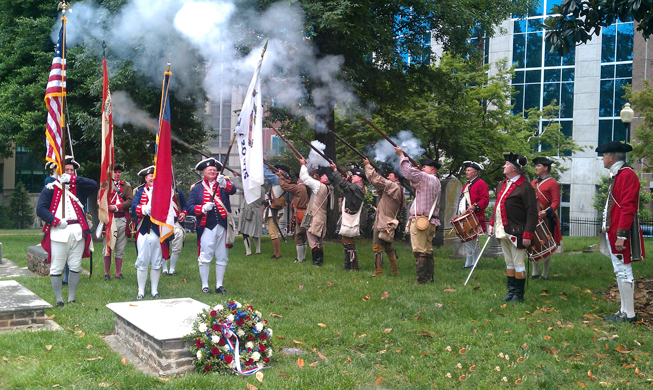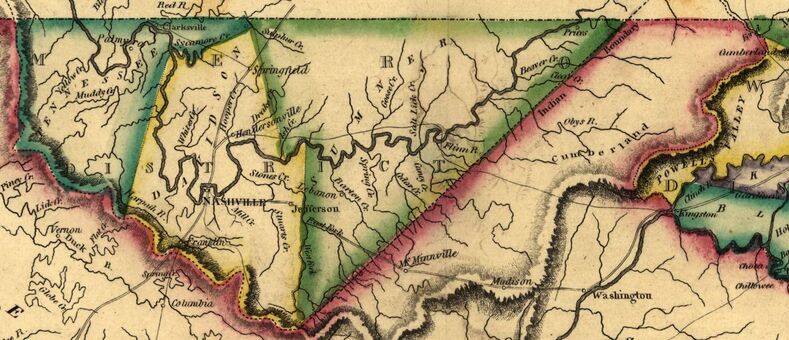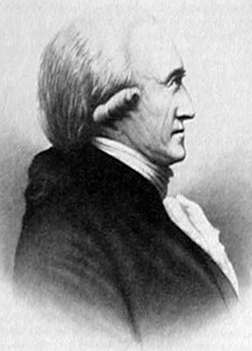|
North Carolina General Assembly Of April 1784
The North Carolina General Assembly of April to June 1784 met in New Bern from April 19 to June 3, 1784. The assembly consisted of the 120 members of the North Carolina House of Commons and 50 senators of North Carolina Senate elected by the voters in April 1784. As prescribed by the 1776 Constitution of North Carolina, the General Assembly elected Alexander Martin to continue as Governor of North Carolina. In addition, the assembly elected members of the Council of State. Legislation This General Assembly passed an act that changed the date of elections from April to the third Friday in August every year and changed the first meeting of the General Assembly to the first Monday in October. That is why there were two General Assemblies in 1783, one that started in April and one that started in October. It was difficult for legislatures to leave their farms and businesses in April to attend the assembly. It was more convenient for them to attend the assembly in the winter. Th ... [...More Info...] [...Related Items...] OR: [Wikipedia] [Google] [Baidu] |
North Carolina General Assembly
The North Carolina General Assembly is the Bicameralism, bicameral legislature of the Government of North Carolina, State government of North Carolina. The legislature consists of two chambers: the North Carolina Senate, Senate and the North Carolina House of Representatives, House of Representatives. The General Assembly meets in the North Carolina State Legislative Building, North Carolina Legislative Building in Raleigh, North Carolina, Raleigh, North Carolina, United States. The General Assembly drafts and legislates the state laws of North Carolina, also known as the ''General Statutes''. The General Assembly is a bicameral legislature, consisting of the North Carolina House of Representatives (formerly called the North Carolina House of Commons until 1868) and the North Carolina Senate. Since 1868, the House has had 120 members, while the Senate has had 50 members. There are no term limits for either chamber. History Colonial period The North Carolina legislature trace ... [...More Info...] [...Related Items...] OR: [Wikipedia] [Google] [Baidu] |
Thomas Polk
Thomas Polk (c. 1732–January 25, 1794) was a planter, military officer in the Continental Army during the American Revolutionary War from 1775 to 1781, and a politician who served in the North Carolina House of Commons, North Carolina Provincial Congress, and Council of State. Polk commanded the 4th North Carolina Regiment in the Battle of Brandywine. In 1786, Polk was elected by the North Carolina General Assembly to the Congress of the Confederation, but did not attend any of its sessions. Polk was a great-uncle of the 11th President of the United States, James K. Polk. Early life and War of the Regulation Polk was born in Cumberland County, Pennsylvania around 1732 to William and Margaret Taylor Polk. His father was of Scotch-Irish descent, and had been born in the Province of Maryland. In 1753, Polk moved to Anson County, North Carolina. In 1755, he married Susanna Spratt, with whom he would have eight children. In 1765, Polk participated in the War of Sugar Creek, in whic ... [...More Info...] [...Related Items...] OR: [Wikipedia] [Google] [Baidu] |
Allegheny Mountains
The Allegheny Mountain Range (; also spelled Alleghany or Allegany), informally the Alleghenies, is part of the vast Appalachian Mountain Range of the Eastern United States and Canada and posed a significant barrier to land travel in less developed eras. The Allegheny Mountains have a northeast–southwest orientation, running for about from north-central Pennsylvania, southward through western Maryland and eastern West Virginia. The Alleghenies comprise the rugged western-central portion of the Appalachians. They rise to approximately in northeastern West Virginia. In the east, they are dominated by a high, steep escarpment known as the Allegheny Front. In the west, they slope down into the closely associated Allegheny Plateau, which extends into Ohio and Kentucky. The principal settlements of the Alleghenies are Altoona, State College, and Johnstown, Pennsylvania; and Cumberland, Maryland. Name The name is derived from the Allegheny River, which drains only a small porti ... [...More Info...] [...Related Items...] OR: [Wikipedia] [Google] [Baidu] |
Greene County, Tennessee
Greene County is a county located on the eastern border of the U.S. state of Tennessee. As of the 2020 census, the population was 70,152. Its county seat is Greeneville. Greene County comprises the Greeneville, TN Micropolitan Statistical Area. History Greene County developed from the "Nolichucky settlement," established by pioneer Jacob Brown on land leased in the early 1770s from the Cherokee people. The Nolichucky settlement was aligned with the Watauga settlement, centered in modern Elizabethton. After the United States became independent, Greene County was formed in 1783 from the original Washington County, North Carolina, part of the former Washington District. The county is named for Major General Nathanael Greene (1742-1786), a major general in the Continental Army from Rhode Island. John Crockett, father of Davy Crockett, and his wife settled in the county near Limestone. Davy Crockett was born there in 1786. At the time, the area was part of the extra-legal sta ... [...More Info...] [...Related Items...] OR: [Wikipedia] [Google] [Baidu] |
Davidson County, Tennessee
Davidson County is a county in the U.S. state of Tennessee. It is located in the heart of Middle Tennessee. As of the 2020 census, the population was 715,884, making it the second most populous county in Tennessee. Its county seat is Nashville, the state capital and largest city. Since 1963, the city of Nashville and Davidson County have had a consolidated government called the "Metropolitan Government of Nashville and Davidson County", commonly referred to as "Metro Nashville" or "Metro". Davidson County has the largest population in the 13-county Nashville-Davidson–Murfreesboro–Franklin Metropolitan Statistical Area, the state's most populous metropolitan area. Nashville has always been the region's center of commerce, industry, transportation, and culture, but it did not become the capital of Tennessee until 1827 and did not gain permanent capital status until 1843. History Davidson County is the oldest county in the 41-county region of Middle Tennessee. It dates to ... [...More Info...] [...Related Items...] OR: [Wikipedia] [Google] [Baidu] |
North Carolina Attorney General
The Attorney General of North Carolina is a statewide elected office in the U.S. state of North Carolina. The attorney general is a constitutional officer responsible for representing state agencies in legal matters, supplying other state officials and prosecutors with legal advice, and leading the North Carolina Department of Justice. The incumbent attorney general, Josh Stein, assumed office on January 1, 2017. The position of attorney general dates back to North Carolina's colonial history. The office was established in North Carolina's 1776 constitution as an official to be appointed by the North Carolina General Assembly. The state's 1868 constitution made the attorney general an elected executive official with their duties prescribed by law. Since 1971, the officer has sat on the North Carolina Council of State. History The title "Attorney General" was used in colonial territory encompassing what became North Carolina as early as 1677, when George Durant was appointed by Go ... [...More Info...] [...Related Items...] OR: [Wikipedia] [Google] [Baidu] |
Alfred Moore
Alfred Moore (May 21, 1755 – October 15, 1810) was an American judge, lawyer, planter and military officer who became an associate justice of the Supreme Court of the United States. Moore Square, a park located in the Moore Square Historic District in Raleigh, North Carolina was named in his honor, as was Moore County, North Carolina. He was also a founder and trustee of the University of North Carolina at Chapel Hill. Moore is noted for having written just one opinion for the Court during his term of service: '' Bas v. Tingy'', a minor case of maritime law. Although a member of the Court for nearly four years, poor health kept Moore from the Court's business during much of his tenure. In particular he did not participate in ''Marbury v. Madison'', a landmark case decided while he was on the Court. Moore was one of the least effective justices in the history of the Court, his career having "made scarcely a ripple in American judicial history." Family and education A ... [...More Info...] [...Related Items...] OR: [Wikipedia] [Google] [Baidu] |
North Carolina Secretary Of State
The North Carolina Secretary of State is an elected constitutional officer in the executive branch of the government of the U.S. state of North Carolina, and is fourth in the line of succession to the office of Governor of North Carolina. The secretary maintains the official journal of the North Carolina General Assembly and is responsible for overseeing land records, chartering corporations, and administering some commercial regulations. The incumbent is Elaine Marshall, a Democrat and the first woman elected to the office. The office traces its origins to the office of the Colonial Secretary of Carolina, created in 1665, and was formally created as an office in 1776. Since 1868, the secretary has been popularly elected every four years. The office's responsibilities—determined by statute—have varied over its existence. Historically weaker than their contemporaries around the United States, the secretary does not oversee elections in the state. They lead the Department of S ... [...More Info...] [...Related Items...] OR: [Wikipedia] [Google] [Baidu] |
James Glasgow
James Glasgow (c. 1735 – November 17, 1819) served as the first North Carolina Secretary of State, from 1777 to 1798. Biography Early life James Glasgow, the son of a Scottish minister, Reverend James Patrick Glasgow and his wife, Martha Jones, of Cecil County, Maryland. He was born in the Colony of Maryland and educated at the College of William & Mary. After graduation he served as an accounting and corresponding clerk for an import-export house in Suffolk, Virginia. Career He was an officer in the American Revolutionary War in North Carolina, and in December 1776, was rewarded by the last of the state's provincial congresses with the office of Secretary of State. From 1777 to 1781, Glasgow lived at Harmony Hall in Kinston. Service record: * Adjutant in the Dobbs County Regiment of the North Carolina militia (1776) * Major in the Dobbs County Regiment (1776-1777) * Colonel in the Dobbs County Regiment (1777-1778, 1779-1780) * Secretary of State (1776-1799) I ... [...More Info...] [...Related Items...] OR: [Wikipedia] [Google] [Baidu] |
Thomas Eaton (general)
Thomas Eaton (c. 1739 – June 1809) was a military officer in the North Carolina militia during the War of the Regulation in 1771 and American Revolutionary War from 1775 to 1784. He was a member of the North Carolina Provincial Congress and North Carolina House of Commons for several terms simultaneously with his military service. Eaton was a member of the North Carolina Council of State under Governor Richard Caswell. Eaton commanded soldiers in the battles of Brier Creek and Guilford Courthouse. At the time of the 1790 census, Eaton was one of the largest slaveholders in North Carolina. Early life and War of the Regulation Eaton was born to William Eaton and Mary Rives, who had moved to North Carolina from Prince George County, Virginia. Eaton was married three times, marrying his first wife, Anna Bland, in 1761. That marriage bore one daughter, Anna, in 1763. After purchasing land in Bute County, North Carolina, Eaton represented that county in the colonial North Caro ... [...More Info...] [...Related Items...] OR: [Wikipedia] [Google] [Baidu] |
James Saunders (North Carolina Politician) (1829–1909), British architect
{{hndis, name=Saunders, James ...
James Saunders may refer to: * James Saunders (boxer) (born 1932), Canadian boxer * James Saunders (composer) (born 1972), British composer * James Saunders (cricketer) (1802–1832), English cricketer * James Saunders (playwright) (1925–2004), English playwright * James Saunders (footballer) (1878–?), English footballer * James Saunders (dancer), American dancer, choreographer and movement teacher * James Ebenezer Saunders James Ebenezer Saunders FRIBA (1829/30 – 24 November 1909) was a British architect and Liberal politician. Early life Career Allinson states that Robert Worley, of the architectural practice Worley & Saunders, was "involved in all kinds ... [...More Info...] [...Related Items...] OR: [Wikipedia] [Google] [Baidu] |
Nathaniel Macon
Nathaniel Macon (December 17, 1757June 29, 1837) was an American politician who represented North Carolina in both houses of Congress. He was the fifth speaker of the House, serving from 1801 to 1807. He was a member of the United States House of Representatives from 1791 to 1815 and a member of the United States Senate from 1815 to 1828. He opposed ratification of the United States Constitution and the Federalist economic policies of Alexander Hamilton. From 1826 to 1827, he served as President pro tempore of the United States Senate. Thomas Jefferson dubbed him "''Ultimas Romanorum''"—"the last of the Romans", like Flavius Aetius. During his political career he was spokesman for the Old Republican faction of the Democratic-Republican Party that wanted to strictly limit the United States federal government. Along with fellow Old Republicans John Randolph and John Taylor, Macon frequently opposed various domestic policy proposals, and generally opposed the internal improvement ... [...More Info...] [...Related Items...] OR: [Wikipedia] [Google] [Baidu] |






.jpg)
